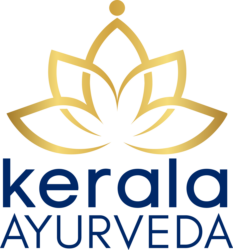Principles of Ayurveda
COURSES > Short
Discover the ancient life science of Ayurveda straight from the root texts
SELF-PACED | 8 lessons
Guided by a master clinician, you’ll study the basic principles of Ayurveda including the elements, Doshas, nutrition, and other fundamentals for optimal wellbeing.
- Build a solid foundation in Ayurvedic principles to implement in your daily life
- Study an ancient 5,000-year-old knowledge system, never watered down
- Learn about the elements and Doshas
- Discover the power of knowing your individual constitution
- Practice a mind-body-spirit approach to wellbeing
- Be inspired to live your life to the fullest by aligning with natural rhythms
- Earn continuing education credits as a Yoga professional
Start learning now
Course Information
- Schedule: Self-paced
- Estimated Time: 2 Days
- Hours: 15 Hours
- Format: Online
Earn Continuing Education Credits: Students are encouraged to submit their program to the National Ayurvedic Medical Association for PACE credits upon completion.
Who should take this course?
Prerequisites
This course is designed for all levels. There is no prerequisite to join.
Student stories

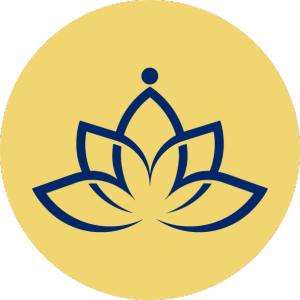
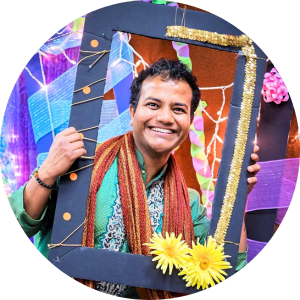
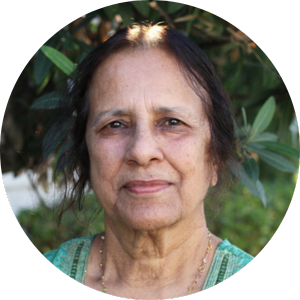
How can I apply Principles of Ayurveda?
- The foundational principles of Ayurveda in this program can support your wellbeing and daily life.
- Use this knowledge to better understand how to live in harmony with natural rhythms and make daily healthy choices.
- Share this knowledge with friends, family or clients.
- Use this foundation of Ayurvedic knowledge as a basis for continued study.
Ayurveda is not only a science of human life. Ayurveda is a science for each and every living being.
VAIDYA. JAYARAJAN KODIKANNATH
Format
VIDEO TUTORIALS
Your course content is video-based including 15 hours of recorded lectures. Each lesson is delivered by master faculty, Vaidya. Jayarajan Kodikannath (BSc, BAMS).
SELF-PACED STUDY
During your learning process, you can start and stop the videos at any point and rewatch them throughout your course access.
6 months access
You’ll receive immediate access to your course upon purchase and enjoy continued access for 6 months. This will be ample time to view and complete your initial study of the 15 hours of course video content, with the option to review them anytime throughout your remaining access period.

Learn at your unique pace
This program can be taken 100% online and is entirely self-paced. Upon registration, you'll gain access to our elearning portal where all your course materials, videos and resources are located.

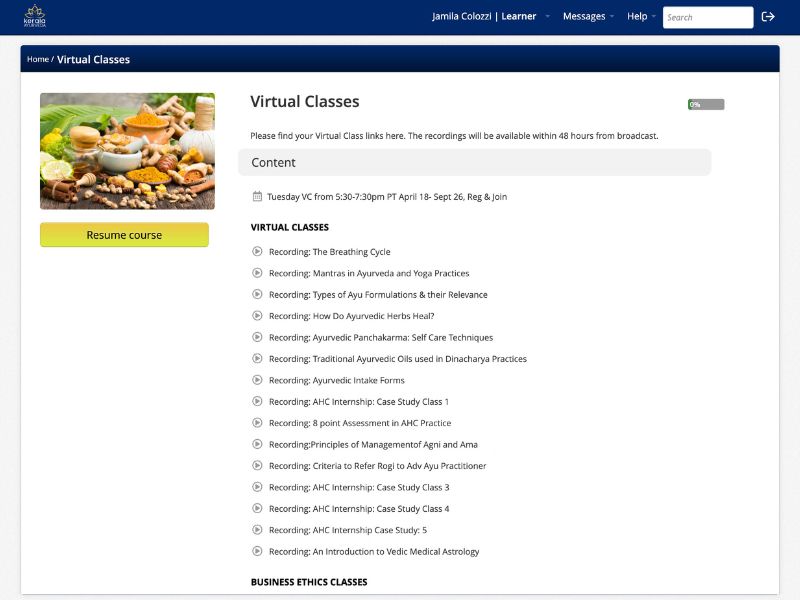
Elearning
Our courses are powered by a robust elearning system that connects our global community of students and faculty. The elearning portal is where students may access all of their course information, materials and curriculum, including: course syllabus, schedule, course manual PDFs, class slide decks, class notes and links to live streaming class sessions. The elearning portal is also where tests and assignments are conducted, and where students may submit questions.
Curriculum
This course is based on the core foundational concepts and practices of Ayurveda. Our curriculum is based on the ancient, indigenous wisdom of the Vedic texts — a body of knowledge spanning thousands of years. These root Ayurvedic texts set the standards for modern-day Ayurvedic practice and are still utilized today by universities in India, where Ayurveda is a licensed medical system.
Principles of Ayurveda draws upon this ancient wisdom, translated into relatable applications for your daily health. We like to call it deep roots, modern voice.
Lessons

Foundations of Ayurveda
Ayurveda is an ancient life-care science that is increasing in popularity each day because of its powerful holistic tools for well-being. It addresses the uniqueness of every individual while simultaneously explaining the interconnectedness of everything that exists. Knowledge of the principles of Ayurveda empowers you to live each day to the fullest. It can help you prevent disease and manage chronic conditions. In part 1, you’ll be introduced to the origin, background, and philosophies of Ayurveda.

The Five Elements and Tridoshas
Everything in the universe is composed of the five elements. This includes the food that you eat, plants and animals around you, your physical body, and the thoughts in your mind. Tuning into these elements can help you understand how your environment and choices impact your mind and body. These five elements give rise to the three functional bodily energies or Doshas. The concept of the Tridoshas further explains your unique physical and psychological nature, which was determined at birth. It explains your constitution and habits and the imbalances you are prone to experiencing. With these principles of Ayurveda, you can adapt your lifestyle to stay balanced.

Tridoshas, Subdoshas, and Introduction to the Body’s Tissues
Ayurvedic Physiology is explained by the Tridoshas or functional energies of the body. Vata is responsible for movement, Pitta for transformation, and Kapha for cohesion and nourishment. Each of these Doshas is made up of five Subdoshas that regulate specific bodily-mind processes. Seven tissues or Dhatus represent the structural or anatomical aspect of Ayurveda. Each of these tissues, or building blocks of the body, has a unique structure and function.

The Body’s Tissues and Immunity
Dhatus, or tissues, are the building blocks of the body and are the locations for the more subtle energies of the Doshas to perform their functions. The Dhatus can be affected by abnormal or aggravated Doshas. According to Ayurveda, there are seven tissues in the body: Rasa (plasma, serum, lymph), Rakta (blood), Māṃsa (muscles), Meda (fat tissue), Asthi (bone), Majja (nerve tissue), and Śukra (reproductive tissue). Maintaining an equilibrium or optimal state of the bodily tissues can prevent diseases and keep your body healthy. Your immune system and vitality, known as Ojas, is the essence of all tissues. Ojas can be enhanced only if all the Dhatus are healthy. Ojas protects you against pathogens and provides strength and energy to operate at your highest potential.

Individual Constitution and the Mind
You have a unique Ayurvedic constitution or Prakriti. It’s the special combination of Vata, Pitta, and Kapha Doshas that you were born with. Knowing your Prakriti will help you to understand your core nature and the choices that support you best. From food choices, exercise, relationships, and career, knowledge of Prakriti can help you navigate it all. Ayurvedic science beautifully explains the mind-body connection. In the same way, the Tridoshas define the bodily energies, the three Guṇas (Sattva, Rajas, and Tamas) define the qualities of the mind. You’ll explore these qualities so you can better manage your mind and tend to the many stressors of life.
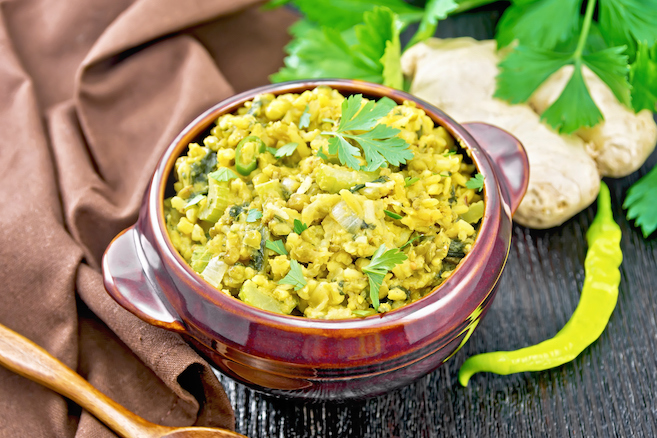
Ayurvedic Nutrition
Dietary practices are one of the primary pillars of life in Ayurveda for your mood and health. Ayurvedic nutrition begins with a lesson on the inputs of life, or Ahara. Your senses digest the energy you receive from your food as well the people you see and the media you watch. Ayurvedic eating is as much about food choices as it is about cultivating a healthy environment. Food should be beautiful and taste good! A blend of the six tastes ensures you enjoy the colors and flavors of your meal, and receive a balance of nutrition.
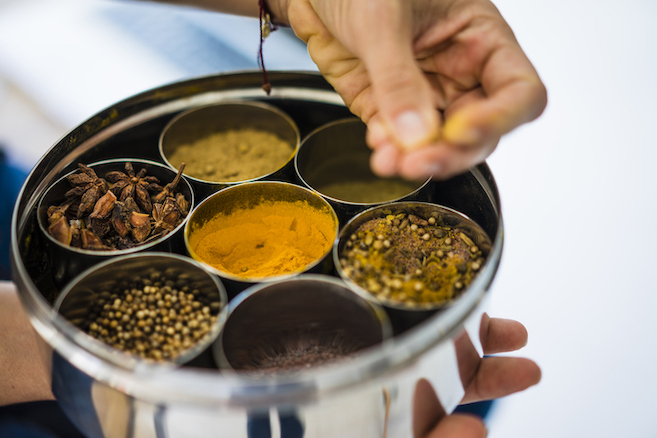
Digestion and Food Guidelines
According to Ayurveda, you are what you digest. There’s a digestive fire in your belly. When digestive fire is strong, you’ll incorporate maximum nutrients. You’ll also efficiently eliminate toxins that cause imbalances and disease. There’s no singular, perfect diet in Ayurvedic science, though there are general guidelines. You’ll discover the principles of Ayurveda that apply to everyone, such as eating fresh and organic food full of life force.

Preventative Practices
The first goal of Ayurveda is “to preserve the health of the healthy.” Ayurveda’s preventative practices are centered around daily, nightly, weekly and seasonal rituals. By aligning with nature and the principles of Ayurveda, you can unlock higher energy levels, increased metabolism, and more joy in your life.

Faculty
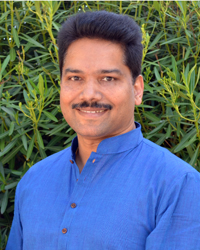
Vaidya. Jayarajan Kodikannath (BSc, BAMS)
Vaidya. Jayarajan Kodikannath is a classically trained Ayurvedic Doctor and an accomplished teacher representing a lineage of Ayurveda practitioners from Kerala, India currently working as the Executive Vice President of KAL India and CEO of Kerala Ayurveda (USA).
Suffused with expertise in Traditional Indian Medicine (Ayurveda) practices especially Panchakarma (Ayurvedic detoxification), a specialty of Kerala Ayurveda tradition, Vaidya. Jayarajan worked as the Chief Medical Officer of the award-winning Ayurvedic Health Resort, Ayurvedagram in Bangalore, India for more than 10 years before relocating to the U.S. in 2010.
He is currently the President of the National Ayurveda Medical Association (NAMA). He is an accomplished teacher for the advanced courses in Ayurveda and the resource person for various training programs conducted in traditional Ayurvedic therapies and medicine. He was on the Board of Directors of California Association of Ayurvedic Medicine (CAAM) and on the Curriculum Board of Bastyr University to create the Masters in Ayurveda program. His corporate sessions and workshops on applications of Ayurveda in daily life, stress management and BMS (Body, Mind & Soul) are immensely popular.
Vaidya. Jayarajan is actively involved in various research projects of Kerala Ayurveda. He has presented several papers on Ayurveda in national and international seminars. His debut publication The Parent’s Complete Guide to Ayurveda can be found wherever books are sold.
Start learning now
$95
What's included
- Access to our elearning system
- 8 lessons with 15 hours of course videos
- Quiz to test your knowledge
- Certification of completion
Frequently asked questions
+1 (888) 275-9103 x20 (Toll Free)
support@keralaayurveda.us
Hours: Mon-Fri 8:30am-4:30pm Pacific
Please note that we are closed on most U.S. holidays and weekends.
If you access your course, or your course was purchased more than 30 days prior, your sale is considered final and not eligible for a refund.
To inquire about a refund, contact Student Support Services at:
+1 (888) 275-9103 x20 (Toll Free)
support@keralaayurveda.us
Hours: Mon-Fri 8:30am-4:30pm Pacific
Please note that we are closed on most U.S. holidays and weekends.
